|
|
|
Sort Order |
|
|
|
Items / Page
|
|
|
|
|
|
|
| Srl | Item |
| 1 |
ID:
146271
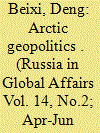

|
|
|
|
|
| Summary/Abstract |
In the post-Cold War era the countries bordering the Arctic have not secured a framework security treaty for operations in that extreme northern region. While attempting not to miss the considerable potential economic advantages, the Arctic nations have been careful to maintain a well-functioning cooperation mechanism and ensure favorable conditions for developing and investing in the region. However, the existing mechanism has failed to prevent negative global trends from affecting the region. The sanctions imposed by the United States and the European Union on investment and the transfer of technologies to Russian oil and gas companies engaged in mineral prospecting and extraction have created a spirit of rivalry in the Arctic between the East and the West.
|
|
|
|
|
|
|
|
|
|
|
|
|
|
|
|
| 2 |
ID:
146260
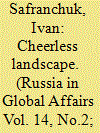

|
|
|
|
|
| Summary/Abstract |
U.S. presidential elections are invariably accompanied by talk about the possibility of turning a new page on some essential political issue or even policy course. In fact, a new administration and policy line is more than guaranteed if the incumbent is not in the presidential race. Today U.S.-Russia relations have plummeted to a low not seen since the end of the Cold War or possibly even earlier. Yet chances for better relations between the two countries when the 45th U.S. president takes office are slim. Indeed, they will remain so at least as long as the current unfavorable situation continues.
|
|
|
|
|
|
|
|
|
|
|
|
|
|
|
|
| 3 |
ID:
146270


|
|
|
|
|
| Summary/Abstract |
S everal landmark events happened in the development of Chinas military capability last year. In April 2015, China for the first time sent its troops to a war-torn country overseas: a Chinese navy task force landed in the Yemeni port of Aden to evacuate Chinese naval force citizens.
|
|
|
|
|
|
|
|
|
|
|
|
|
|
|
|
| 4 |
ID:
146269
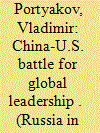

|
|
|
|
|
| Summary/Abstract |
When China caught up with Japan in terms of GDP in 2010, that fact attracted worldwide attention and sparked numerous responses and comments from the international media. Meanwhile, another event, probably just as important, which took place a few years later, has remained almost unnoticed.
|
|
|
|
|
|
|
|
|
|
|
|
|
|
|
|
| 5 |
ID:
146264
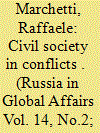

|
|
|
|
|
| Summary/Abstract |
Civil society actors have become key players in conflicts, especially in intra-state ones. This has been facilitated by the transformation of conflicts, increasingly characterized by high-intensity intra-border ethno-religious tensions and strong international influence by proxy. The usual take on conflicts focuses on the role of governmental actors, both national and international. Accordingly, violence and peace are usually considered to be determined above all by the political decisions of official institutions alone. While this remains partly true, in this paper I examine the other side of the coin: the non-governmental component in conflicts. Civil society actors, or as I define them, conflict society organizations, are increasingly central in view of the high degree of complexity of contemporary conflicts. These are conflicts that can only be understood by combining macro with micro approaches that focus on society. It is thanks to the latter approach that it is possible to unpack the political inputs, be they good or bad, which emerge from below, from the civil society domain, and scale up to the top political echelons. This is even more so in societies that are highly fragmented and deprived of stable governing institutions. It is in failing states such as those undergoing an ethno-political conflict that much of politics unfolds "on the ground." Hence it is there, at the micro level, that we need to explore
|
|
|
|
|
|
|
|
|
|
|
|
|
|
|
|
| 6 |
ID:
146268
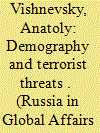

|
|
|
|
|
| Summary/Abstract |
Someone may find the idea strange of a link between demography and terrorism. Is this plausible or is it far-fetched? The meaning of my reflections is that the demographic component of what we now call international terrorism (although I am not sure that this is an accurate definition of what is happening today) is very important, yet I certainly do not mean to assert that only demographic events and processes fuel terrorism. Nevertheless, understanding the essence of global demographic processes has made it possible to foresee the present growth of terrorist threats long before they became a stark reality of our world today.
|
|
|
|
|
|
|
|
|
|
|
|
|
|
|
|
| 7 |
ID:
146265
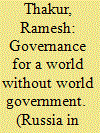

|
|
|
|
|
| Summary/Abstract |
There is no government for the world. Yet, on any given day, innumerable commercial, professional, diplomatic and personal cross-border activities take place in reasonable expectation of safety and security for the people, groups, firms and governments involved. Disruptions and threats are rare-indeed, in many instances rarer in the international domain than inside some countries. Thus international transactions are typically characterized by order, stability and predictability. This immediately raises a puzzle: how is the world governed even in the absence of a world government in order to produce norms, codes of conduct and regulatory, surveillance and compliance instruments? The answer is global governance whose content embraces the totality of laws, norms, policies and institutions that define, constitute and mediate relations between citizens, societies, markets and states in the international system.
|
|
|
|
|
|
|
|
|
|
|
|
|
|
|
|
| 8 |
ID:
146262
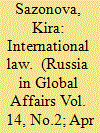

|
|
|
|
|
| Summary/Abstract |
International developments over the last three to five years have created a situation where questioning the practicality of international law, criticizing it for being inefficient and weak, and predicting, with a thoughtful air, its immediate collapse has become not just a commonplace but dominant mode of behavior among many Russian and foreign historians, political analysts and international relations experts. Indeed, the situation does not look encouraging: the cumbersome and overly bureaucratized United Nations; U.S. attempts to establish a unipolar world based on the use of force and diktat; a phantasmagoric caliphate in the Middle East, terrorizing the whole world; the "great transmigration of peoples" on the Eurasian continent-this list can be continued endlessly. Against this background, statements about a "leading and guiding" role of international law may seem too pompous.
|
|
|
|
|
|
|
|
|
|
|
|
|
|
|
|
| 9 |
ID:
146255
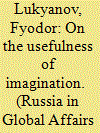

|
|
|
|
|
| Summary/Abstract |
The hackneyed saying "It's tough to make predictions, especially about the future" is as relevant today as never before, but there is no stopping to the audacious flight of imagination. Popular as it is, extrapolation of current trends to future periods does not work as something always gets in the way, while attempts to draw a completely different picture look like imaginative writing. And still we have taken the risk. Interestingly, Yevgeny Kuznetsov's futurological view based mainly on technological aspects does not seem to be at odds with present-day sociopolitical tendencies. In other words, technological breakthroughs do not change the general vector of global development but rather accelerate it.
|
|
|
|
|
|
|
|
|
|
|
|
|
|
|
|
| 10 |
ID:
146266


|
|
|
|
|
| Summary/Abstract |
Russia's air operation in Syria is the most spectacular military-political event of our time. In its post-Soviet history, it is the first time that Russia's Armed Forces were deployed and extensively used in real combat conditions beyond the boundaries of the former Soviet Union. The Syrian campaign is the largest engagement of the Russian Air Force since the war in Afghanistan, and is unparalleled in the history of Russian and Soviet aviation in terms of complexity and intensity of warfare and the remoteness of the area of operations.
|
|
|
|
|
|
|
|
|
|
|
|
|
|
|
|
| 11 |
ID:
146261
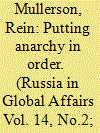

|
|
|
|
|
| Summary/Abstract |
Every political system, and the international system is not an exception, faces the problem of power. Without effective power there is anarchy and chaos while concentration of power suppresses individual as well as collective liberties. Within societies organized as states, i.e. relatively hierarchical societies, one of the most effective remedies against excessive concentration of power is the principle of separation of powers into legislative, executive and judicial branches and their balance. International society (or system) is a horizontal or relatively anarchical system where power is much more dispersed in comparison with societies organized as states.
|
|
|
|
|
|
|
|
|
|
|
|
|
|
|
|
| 12 |
ID:
146257


|
|
|
|
|
| Summary/Abstract |
Fundamental global changes today are forcing countries to thoroughly reconsider their future capabilities. A combination of geopolitical, social, and technological shifts drastically complicates the task of an analyst. Although any forecasts are risky to make in such a situation, it makes sense to try and blend the variety of circumstances into several likely scenarios the world and Russia may follow.
|
|
|
|
|
|
|
|
|
|
|
|
|
|
|
|
| 13 |
ID:
146256
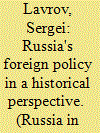

|
|
|
|
|
| Summary/Abstract |
There are different opinions, and doubts too, as to whether Russia assesses the international situation and its position in the world soberly enough. This is an echo of never-ending disputes between pro-Western liberals and the advocates of one's own unique path. There are also people, both inside and outside the country, who believe that Russia is doomed to constantly fall behind and catch up, or adapt to the rules invented by others, and therefore cannot claim a rightful role in international affairs. Let me offer some thoughts on these issues, recalling facts from history and drawing historical parallels.
|
|
|
|
|
|
|
|
|
|
|
|
|
|
|
|
| 14 |
ID:
146267
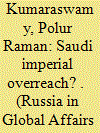

|
|
|
|
|
| Summary/Abstract |
Regional tension following the Saudi hanging of dissident Shia cleric Nimr Baqir al-Nimr on charges of sedition and incitement comes at a time when Riyadh's regional influence is waning. Through a series of ambitious but ill-advised policy choices and external interventions, the ruling al-Saud family has over-stretched its capabilities and resources and in the process squandered its regional position and influence. While the Saudi concerns vis-à-vis Iran and its hegemonic ambitions both before and after the nuclear deal are understandable, the manner in which Riyadh sought to mitigate these challenges indicates a lack of foresight and strategic thinking.
|
|
|
|
|
|
|
|
|
|
|
|
|
|
|
|
| 15 |
ID:
146259


|
|
|
|
|
| Summary/Abstract |
Nearly 70 years ago, George Kennan wrote his famous long telegram, later published as "The Sources of Soviet Conduct" in Foreign Affairs. Kennan's seminal article integrated material, ideological and historical factors into its analysis, developing a comprehensive and holistic approach to studying the foreign policy of the Soviet Union. Inspired by Kennan's work, this article outlines the structural, domestic, and ideational sources of contemporary U.S. policy towards Russia. These three factors reinforce a dominant narrative among U.S. policymakers that sees the U.S. as defending the status-quo against Russia's revisionist challenge to the post-Cold War international order. They shape the U.S. response to this perceived challenge, preventing the U.S. from seeking out an accommodation with Russia, but also discouraging it from immediately and forcefully confronting the "Russian threat"-even though many powerful domestic constituents lobby for this course of action.
|
|
|
|
|
|
|
|
|
|
|
|
|
|
|
|
| 16 |
ID:
146263


|
|
|
|
|
| Summary/Abstract |
Late last year the IMF decided upon a seemingly technical policy change that would allow it to continue to lend in support of a country's economic program even when there are unresolved debt arrears owed to official creditors. In doing so, the decision overturned one of the policy pillars of IMF doctrine. For decades the IMF's earlier stance, working in close cooperation with the Paris Club of official creditors, served to resolve debt issues by facilitating a timely agreement aiming to provide debt sustainability to the debtor country and financing assurances to the IMF.
|
|
|
|
|
|
|
|
|
|
|
|
|
|
|
|
| 17 |
ID:
146258
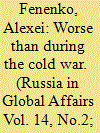

|
|
|
|
|
| Summary/Abstract |
The idea of writing this article came to me after a roundtable discussion of the prospects of U.S.-Russia relations hosted by the Rossiya Segodnya news agency in November 2015.1 argued during the discussion that relations between the two countries had entered a period which is much more dangerous than the Cold War, including the Caribbean Crisis in 1962, and received critical responses ("We were on the brink of a nuclear war back then, but there is nothing like that now," my opponents retorted). And yet, I believe that the risk of a military conflict between Russia and the United States in the next ten to fifteen years will be much higher than it was during their bipolar standoff.
|
|
|
|
|
|
|
|
|
|
|
|
|
|
|
|
|
|
|
|
|